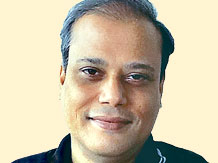Financial reforms: RBI had opposed it, UPA was cold, now Pranab Mukherjee pushes it with Narendra Modi -
![Srikrishna]() Written by P Vaidyanathan Iyer | New Delhi | Posted: November 27, 2014 4:27 am | Updated: November 27, 2014 8:31 am- See more at: http://indianexpress.com/article/india/india-others/financial-reforms-rbi-had-opposed-it-upa-was-cold-now-pranab-pushes-it-with-modi/99/#sthash.yhiVedog.dpuf
Written by P Vaidyanathan Iyer | New Delhi | Posted: November 27, 2014 4:27 am | Updated: November 27, 2014 8:31 am- See more at: http://indianexpress.com/article/india/india-others/financial-reforms-rbi-had-opposed-it-upa-was-cold-now-pranab-pushes-it-with-modi/99/#sthash.yhiVedog.dpuf
http://indianexpress.com/
http://www.business-standard.com/article/opinion/debashis-basu-a-swachh-financial-sector-abhiyan-114111600840_1.html
Modi has now asked Finance Ministry to explain the inordinate delay in implementing the recommendations of the Srikrishna committee.
 Written by P Vaidyanathan Iyer | New Delhi | Posted: November 27, 2014 4:27 am | Updated: November 27, 2014 8:31 am
Written by P Vaidyanathan Iyer | New Delhi | Posted: November 27, 2014 4:27 am | Updated: November 27, 2014 8:31 amA STIFF opposition by the Reserve Bank of India (RBI) and an uninterested approach by the Finance Ministry over financial sector reforms recommended by the Financial Sector Legislative Reforms Committee (FSLRC) has prompted President Pranab Mukherjee to make an unusual intervention and take up the issue with Prime Minister Narendra Modi.
The committee, chaired by Justice (Retd) B N Srikrishna, which submitted its report on March 22, 2013, suggested dramatic changes to the financial sector’s regulatory architecture. These include putting in place an Indian Financial Code that will replace the bulk of existing laws and creating a single regulator for pension, equity, insurance and commodities markets. The RBI will continue with its present mandate of deciding the monetary policy and monitoring and supervising banks and payment systems.
In a letter to the Finance Ministry last month, Principal Secretary in the Prime Minister’s Office Nripendra Mishra said Mukherjee had spoken to the Prime Minister about the import of the FSLRC’s recommendations which would do away with a multitude of laws, usher in consumer protection and create a single agency to manage government debt. Mukherjee is learnt to be irked that 18 months had passed with little or no progress on the implementation front.
The FSLRC was set up by the Congress-led UPA government on March 24, 2011, when Mukherjee was the Union Finance Minister. The committee took two years to finalise the report and submitted it to P Chidambaram, who returned as Finance Minister on July 31, 2012, after Mukherjee became President. Chidambaram remained the Finance Minister till the end of this government’s term.
Modi’s office has now asked the Finance Ministry to explain the inordinate delay in implementing the recommendations of the committee.
The report, which saw dissent notes on certain aspects by four of the committee members, has come under serious attack from RBI Governor Raghuram Rajan. In a June 14 talk this year — within a month of the Modi government taking charge at the Centre — Rajan described the committee’s recommendation on the appropriate size and scope of regulators as “somewhat schizophrenic”.
The report, which saw dissent notes on certain aspects by four of the committee members, has come under serious attack from RBI Governor Raghuram Rajan. In a June 14 talk this year — within a month of the Modi government taking charge at the Centre — Rajan described the committee’s recommendation on the appropriate size and scope of regulators as “somewhat schizophrenic”.
“…the recommendations seem faddish and impressionistic rather than based on deep analysis,” he said addressing the First State Bank ‘Banking and Economic Conclave’ in Mumbai. He went on at length about the dangers of excessive legal oversight on regulators.
According to sources, the President feels it has been 18 months of a lost opportunity. They pointed out that Rajan’s observations have not cut much ice with the the BJP-led government. At a very broad level, Modi believes that a multitude of laws is not a good idea, government sources said. He has, on more than one occasion, said the government would do away with laws that do not serve much purpose in today’s environment, they added.
The Finance Ministry, which has so far maintained that a view on the report would be taken after consulting all stakeholders, has not offered any strong reaction to Rajan’s argument either. The sources noted that the Prime Minister has taken the President’s observations in right earnest.
http://indianexpress.com/
http://www.business-standard.com/article/opinion/debashis-basu-a-swachh-financial-sector-abhiyan-114111600840_1.html
